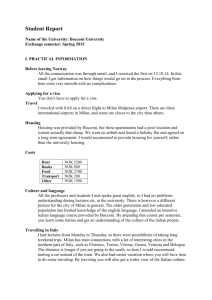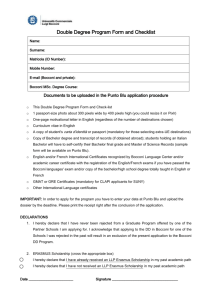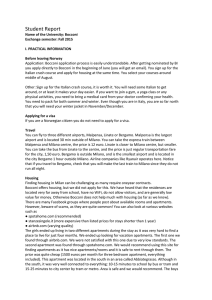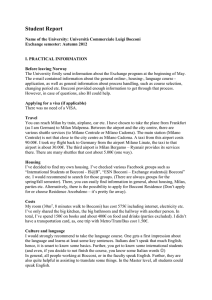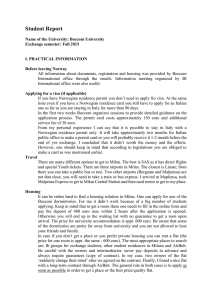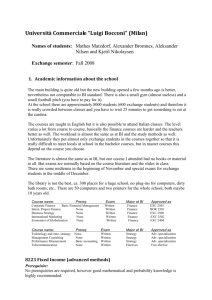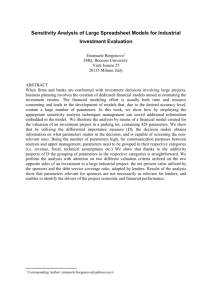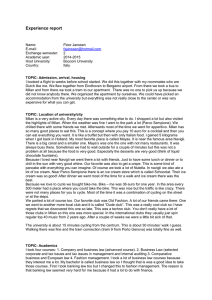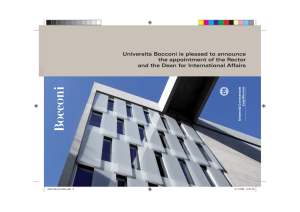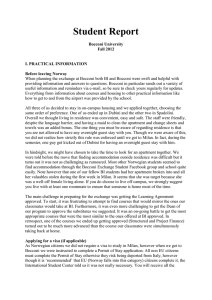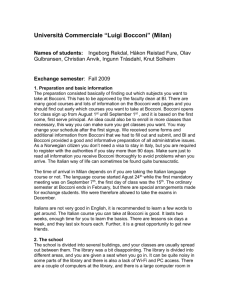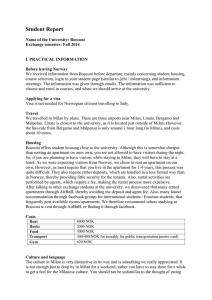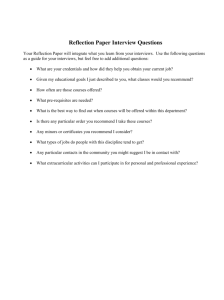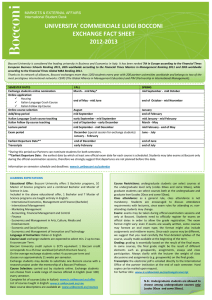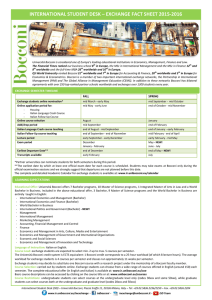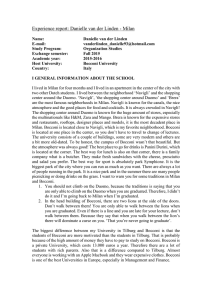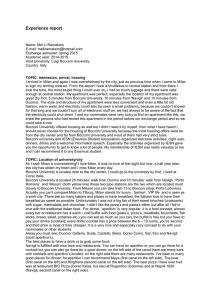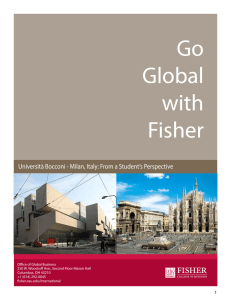Bocconi - Fall 2013 II - BI Norwegian Business School
advertisement
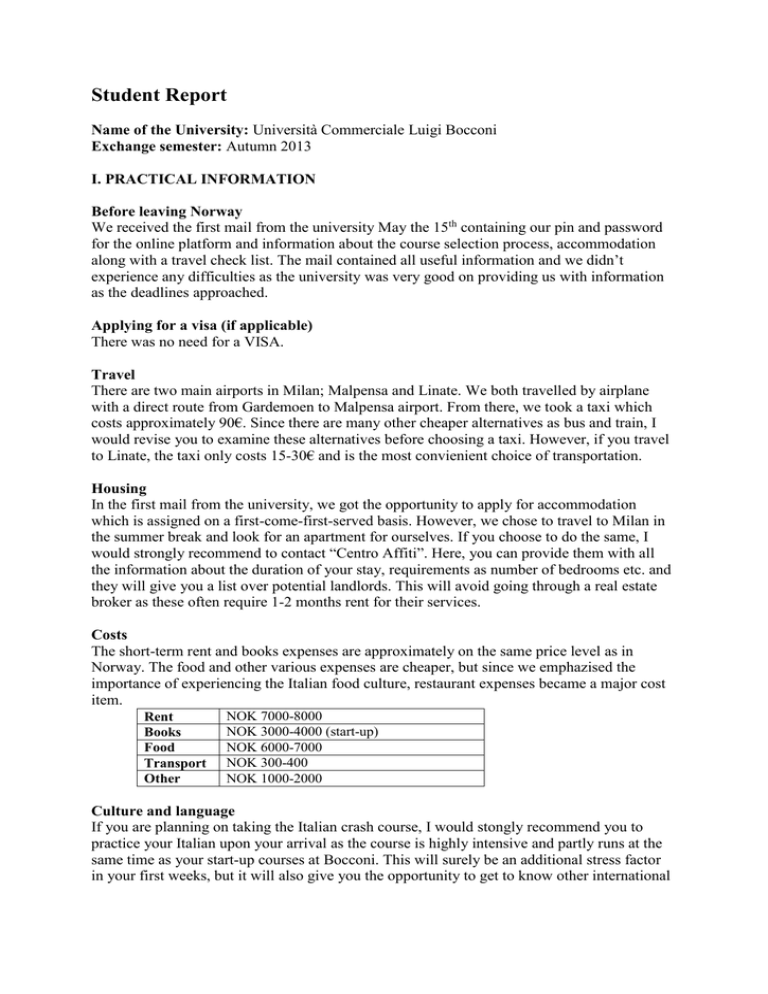
Student Report Name of the University: Università Commerciale Luigi Bocconi Exchange semester: Autumn 2013 I. PRACTICAL INFORMATION Before leaving Norway We received the first mail from the university May the 15th containing our pin and password for the online platform and information about the course selection process, accommodation along with a travel check list. The mail contained all useful information and we didn’t experience any difficulties as the university was very good on providing us with information as the deadlines approached. Applying for a visa (if applicable) There was no need for a VISA. Travel There are two main airports in Milan; Malpensa and Linate. We both travelled by airplane with a direct route from Gardemoen to Malpensa airport. From there, we took a taxi which costs approximately 90€. Since there are many other cheaper alternatives as bus and train, I would revise you to examine these alternatives before choosing a taxi. However, if you travel to Linate, the taxi only costs 15-30€ and is the most convienient choice of transportation. Housing In the first mail from the university, we got the opportunity to apply for accommodation which is assigned on a first-come-first-served basis. However, we chose to travel to Milan in the summer break and look for an apartment for ourselves. If you choose to do the same, I would strongly recommend to contact “Centro Affiti”. Here, you can provide them with all the information about the duration of your stay, requirements as number of bedrooms etc. and they will give you a list over potential landlords. This will avoid going through a real estate broker as these often require 1-2 months rent for their services. Costs The short-term rent and books expenses are approximately on the same price level as in Norway. The food and other various expenses are cheaper, but since we emphazised the importance of experiencing the Italian food culture, restaurant expenses became a major cost item. Rent Books Food Transport Other NOK 7000-8000 NOK 3000-4000 (start-up) NOK 6000-7000 NOK 300-400 NOK 1000-2000 Culture and language If you are planning on taking the Italian crash course, I would stongly recommend you to practice your Italian upon your arrival as the course is highly intensive and partly runs at the same time as your start-up courses at Bocconi. This will surely be an additional stress factor in your first weeks, but it will also give you the opportunity to get to know other international students. It can also be useful to have a basic level of Italian as few Italians speak English. Nonetheless, all students and people working at Bocconi speak English. II. ABOUT THE SCHOOL The school of Bocconi contain of four main buildings. The largest of them is only for big events as well as offices for the professors. Two of the other buildings are used for teaching and also contain several working areas. However, these study spaces are quite noisy and are almost allways overcrowded. The last building is the library which is quite similar to the ones at BI where you can study in quiet areas and book group rooms through the library’s web page. Around the school there are several resturants, café’s, shops, gelaterias and grocery stores. There is also a gym with a corresponding football field that can be booked if you have a gym membership. Course registration The course selection for the fall semester took place in the period August 20th to August 29th. This was done through Bocconi’s online platform (yoU@B). The university will provide you with all the guidelines in a mail prior to the selection process. The add/drop period was scheduled in the period September 11-19th. Academic calendar Arrival date: First day of the semester: Last day of classes: Examination period: Any special events/holidays: 26.August 2013 05.September 2013 09.Desember 2013 10.Desember 2013- 21.Desember 2013 (Our exams: 10.Desember 2013 – 12.Desember 2013) Midterms; Mid- of October Arrival Upon arrival, you will need to check-in with the International Student Desk. This was done in the period September 2nd to September 4th. At the check-in, you will receive your Bocconi student card which you will need to access the library, printing out papers etc. along with a welcome kit that included information about the university and the city of Milano. In the introduction week, the International Student Desk will also arrange campus tours, city tours along with a series of events. The International Office The international office of Bocconi was always very helpful. Further, there was no problem talking English with them. Social activities We experienced that all the Italians in our classes was very open for exchange students and we developed a good relationship with several native students in our classes. The relationship between the exchange students was very good as well where everyone wanted to connect to other international students and expand their contact network. The facebook page “isdbocconi” provided a platform for exchange students to keep in touch and it also updated on upcoming events. III. ACADEMICS Corporate Valuation 6p: This course is by far one of the most rewarding courses we have had so far. It gave us a broad and detailed understanding of all parts of corporate finance, and the various ways of valuing both corporations and private firms. One of the greatest parts of this course was the guest speakers from Deutsche Bank (Investment Banking, Equity Research) and LSE (London Stock Exchange) explaining different aspects of corporate valuation. We also briefly analysed several corporations based on reports provided by Merill Lynch and Borsa Italia, however this was not expected, but we highly recommend that you do this as it yielded us greater understanding of how to analyse different types of companies (high growth, financial institutions, private companies, cyclical companies etc.). The curriculum consisted of the greater part of the book Valuation, which is considered to be the bible for corporate finance. We analysed the chapters of the book and really enjoyed reading it. The Exam: The exam was about one hour long and was poorly structured. We did not know when to start/end and the questions were quite difficult to understand. Financial Statement and Financial Statement Analysis 11p: The teacher of this course was very good and was very helpful, and the structure of the course was very intuitive and really helped us study in a efficient way. The course provided us with a deep understanding of financial accounting, how to consolidate financial statement and how to analyse industries based on the four major financial statements. This course is probably the most useful course we have ever had, as it provided us with tools for understanding financial statements in a more detailed manner. Thus, we highly recommend everyone interested in finance and accounting to take this course, as the tools for understanding how the financial statements work are fundamentally important for being able to analyse and interpret them correctly. Also, it greatly helped us better understand the part of restructuring and forecasting financial statements in the subject “Corporate Valuation”. The Exam: The exam was divided into one midterm- (middle of October) and one final- exam (in the beginning of December), the exam was quite easy and consisted of 15 multiple choice and 4 other problems. The time of the exam was about 1.5 h. It is also possible to only take one general exam at the end of the course. However, we highly recommend you participate in the midterms, as the December (last) exam period is hectical. Business Strategy 6p: The positive aspect of this course was that it was based on cases, which promoted us to think independently without theoretical frameworks. We handed in 2 cases during the year, accounting for 25% of the grade, 15% was based on class participation, and 60% was based on the final exam, which constituted of a case. The Exam: The exam was about 2.5 hours long and was poorly structured; we did not get all the pages on the exam, which added to the stress of completing the case on time, the questions were also confusing and difficult to understand. It was a very stressful exam and we recommend that you study on completing cases on a short amount on time, as that is the greatest hurdle. All in all we are very pleased with our experience here in Milan. However there was only one negative aspect, the exam; - Poorly structured questions, and rules concerning the exam Little amount of time Vague information concerning all aspects on the exam session Never starts on time,often 30 min late Poorly structured dates for exchange students (some students had 2-3 exams in one day, we had all of our exams three days in a row, which decreases your ability to perform) Despite of this, we highly recommend students to study at Bocconi.
